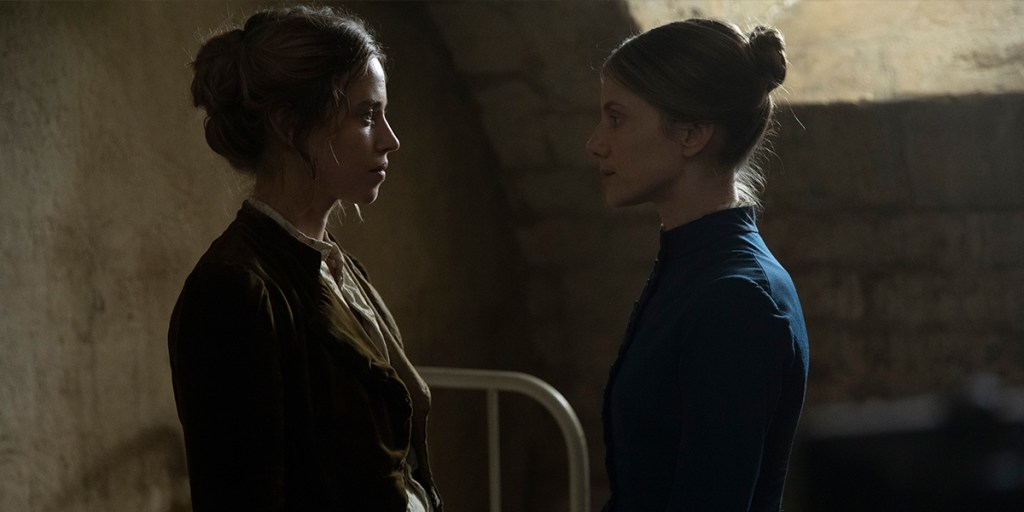You have to hand it to the patriarchy: they set up an entire society designed to oppress women, to deprive them of any meaning or purpose in their lives, and then they act all surprised when it drives them crazy.
Of course, Eugénie (Lou de Laâge) isn’t actually crazy, but she does speak to the dead. But even just nonconformity is reason enough to lock her up, and in the not-so-long-ago (1885), all you needed was one male relative to want to get rid of you, and a woman could be imprisoned in an insane asylum for life. Eugénie is in Salpêtrière, a Parisian asylum, where she befriends wins over a skeptical nurse, Geneviève (Mélanie Laurent). This nurse no-nonsense and scientifically inclined, but when her dead sister starts sending messages through Eugénie, even she must admit that this woman doesn’t belong here. Together, they plan Eugénie’s escape under the cover of Le bal des folles, the mad women’s ball.
Unfortunately, though not surprisingly, this film is based on real events. Salpêtrière was a real asylum that locked up women and threw away the key based on some very flimsy excuses – and any who were actually crazy were mostly driven that way by the very men who committed them. The women were subjected to barbaric experiments, abused by staff, and the film (and the book upon which it is based) exposes the misogyny inherent in medicine at the time (not all of which has been eliminated today).
Thomas Jefferson once said “The measure of society is how it treats the weakest members,” a scathing indictment of himself, a slave owner, and every psychiatric hospital ever. The Mad Woman’s Ball was indeed a real event hosted ever year, inviting Paris’ high society to come and gawk at the mentally ill, all dressed up in cast-offs and costumes.
Mélanie Laurent writes and directs a story she makes seriously cinematic and strikes a timeless chord, showing the universality of society’s most interesting women being silenced, in board meetings or at the stake, but always one way or another. At the time, women were diagnosed “hysterical” for having an opinion; today she’s called “shrill” or “feminazi” or “sjw.” Bottom line: yes, there’s a message, a grimly timely one, but it’s also just a beautiful film that’s well-acted by an asylum’s worth of talented actresses, with a story to remember.
The Mad Women’s Ball (Le bal des folles) is an official 2021 selection of TIFF.
Look for it on Amazon Prime!


Interesting. Alias Grace was one of my dissertation texts and it deals with a lot of the same issues.
LikeLike
Always looking for good French films. Thanks!
LikeLike
It’s on Amazon Prime? Oh, thank you. I hope to see it ASAP as I do love Melanie Laurent’s work as a filmmaker.
LikeLike
This does not surprise me.
LikeLike